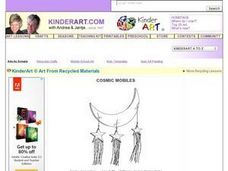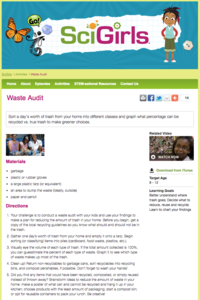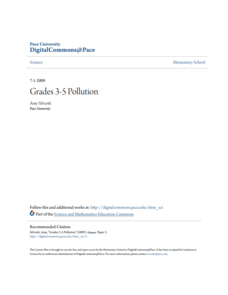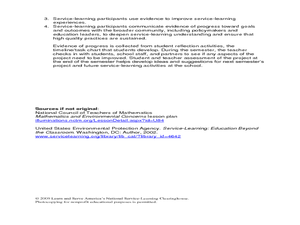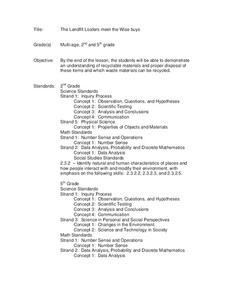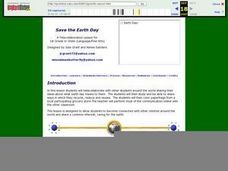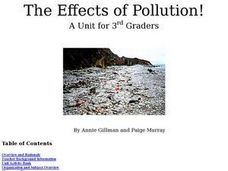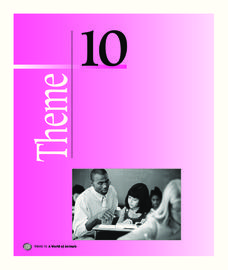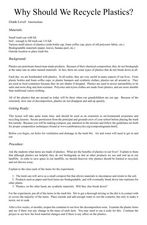Curated OER
Solid Waste Recycling
Pupils plan a "no garbage" lunch and hold a classroom contest to sort grabage into what can and what can't be recycled. They assess the importance of reducing the amount of garbage in the environment and set up a book recycling program.
Curated OER
Cosmic Mobiles: Recycled Art
If you have a little left over tinsel and aluminum foil, your class can create these fun moon and star mobiles. Poster board or recycled cardboard become your moon and stars; the tinsel gives them sparkle. This would be a great...
PBS
Waste Audit
Does everything in the trash can belong there? Conduct a waste audit with your class by collecting a day's worth of garbage, separating it into recyclables, non-recyclables, or food waste, and properly distributing what they find into...
NASA
Transportation and Space: Reuse and Recycle
What can I use in space? The three-lesson unit has groups research what man-made or natural resources would be available during space exploration or habitation. Team members think of ways that resources can be reclaimed or reused in...
Beyond Benign
Evaluating Sustainability and Lifecycle
What makes one product greener than another? Ecology scholars analyze sustainability and lifecycle through a thought-provoking activity. Individuals pick a product, then examine its components to determine its overall impact on the world...
Pace University
Pollution
Over the course of 10 days, scholars take a pre-assessment to place them in one of three leveled groups. Whole-class and in small groups, pupils take part in read-alouds, field trips, hands-on activities, and complete learning contracts...
Curated OER
School-Wide Recycling
Students investigate recycling. In this environmental lesson, students design a recycling program for their school. Students collect data about how much recyclable materials they use in one week. Students also survey classmates about how...
San Francisco Public Utilities Commission
Recycled Water: A Smart Way to Reuse Water
Learn about wastewater and recycled water with a science reading activity. After learners finish a two-page passage about conserving the water supply, they answer six comprehension questions about what they have read.
Curated OER
RECYCLING (WORD SEARCH)
In this recycling word search, students are given 11 words related to recycling and are asked to find these words in the word search puzzle.
Curated OER
The Landfill Loafers Meet the Wise Buys
Students discover recyclable materials and the proper disposal of those items through Internet research. Working in groups of four, they search the Internet for uses of recyclable materials. After research is complete, they participate...
Curated OER
Fabric Art
Do kids use problem solving skills when they create scrap art? You bet they do! After examining the art of Mary Katherine Lamb, they create their own pieces using recycled products and vintage art techniques. They watch a video about the...
Curated OER
Save the Earth Day
First graders tellacollaborate with other students around the world sharing their ideas about what earth day means to them. They share ways in which they recycle, reduce and reuse.
Teach Engineering
Building an Electromagnet
Your pupils can build their own electromagnet — awesome! The culminating activity in an eight-part series challenges groups to design and build their own electromagnet. The goal of the activity is to build a magnet capable of picking up...
Curated OER
Make Your Own Paper
Students create their own paper from recycled products. Students describe the steps of the paper-making process, then practice making their own.
Curated OER
The Effects of Pollution!
Learners examine pollution and how it affects the environment. They discuss how human activities lead to more pollution. They talk about the importance of recycling. There is a skit, resource links, and activities provided to make this a...
Curated OER
Egg Carton Lobsters
Who doesn't love learning about the ocean? And who wouldn't want to help create an ocean themed mural? Little learners make lobsters out of recycled egg cartons, pipe cleaners, and paint. These are then used as part of a larger 3-D ocean...
Teach Engineering
Where Are the Plastics Near Me? (Field Trip)
With a piece of plastic here and a piece of plastic there, here a piece, there a piece, everywhere a piece. Teams go on a field trip in order to document the locations and kinds of plastic trash in an area near them. The eighth...
Curated OER
Stamp Boxes or Jars: Recycled Art
With some canceled stamps, an old box, and some glue, learners create art from scraps. You save up or gather used postage stamps, the kids glue them onto a box or an old clean jar. All the steps needed to complete this project plus two...
Curated OER
Earth Day Activities
Earth Day is April 22nd - you can celebrate by incorporating some environmental activities into your curriculum Code: F7G4U8JHCDTD.
K-State Research and Extensions
Water
How are maps like fish? They both have scales. The chapter includes six different activities at three different levels. Scholars complete activities using natural resources, learn how to read a map, see how to make a compass rosette,...
Cal Recycle
Conserving Natural Resources
Trying to plan an engaging elementary science unit on natural resources? Conserve your energy! This five-part series of lessons and hands-on activities has exactly what you need to teach young scholars about the importance of conservation.
Houghton Mifflin Harcourt
That’s Amazing!: Challenge Activities (Theme 3)
Synonym dominoes, anyone? As part of the activities designed for kids who have mastered the basic concepts in the Houghton Mifflin Harcourt thematic unit That's Amazing! kids are offered a variety of activities that include...
Houghton Mifflin Harcourt
A World of Animals: Challenge Activities (Theme 10)
Animals are the theme of this series of challenge activities. Extend scholars' learning opportunities by writing personal narratives and book reports, creating picture and alphabet books, and drawing scenes from stories read aloud.
Curated OER
Why Should We Recycle Plastics?
Students understand the value and harmful effects of plastics. In this plastics recycling lesson, students create a small compost bin that allows materials to return to the soil. Students explore what happens to the plastic in their...



